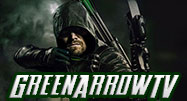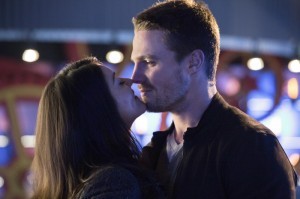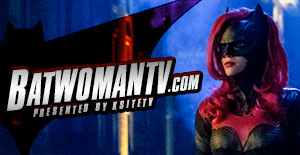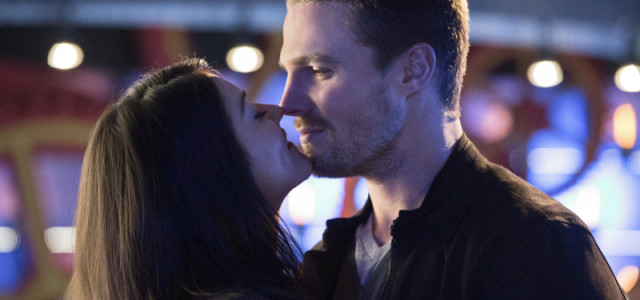
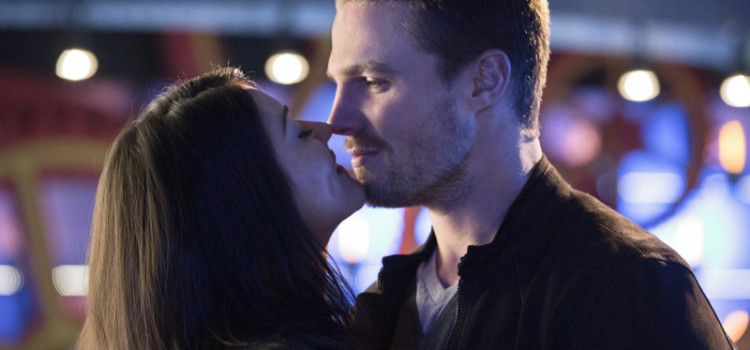
Arrow #1.17 “The Huntress Returns” Recap & Review
Recaps & Reviews March 21, 2013 Derek B. Gayle

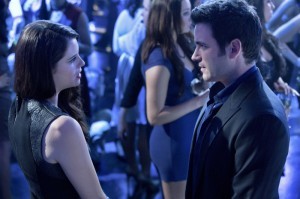 Summary: Our favorite/least favorite (depending on who you ask) “psycho ex-girlfriend” is back, and though it’s a bit of a mixed bag again, it’s a fun and certainly much-improved one.
Summary: Our favorite/least favorite (depending on who you ask) “psycho ex-girlfriend” is back, and though it’s a bit of a mixed bag again, it’s a fun and certainly much-improved one.
If you have not seen this episode yet and do not wish to be spoiled, do not continue reading!
Read an in-depth recap on our handy episode guide!
Review
The first two Huntress-centric installment were some of Arrow’s weakest episodes (or biggest letdowns, at the very least) for a number of reasons. “The Huntress Returns” didn’t have much to live up to, especially so soon, but thanks to a simplification of the title character’s motivations, coupled with the background stuff that’s already been bubbling in the back half of the season, it spins quite a good tale.
While Jessica De Gouw didn’t really improve from her last appearance—the line readings in her first scene were particularly awkward—Helena’s less complex motives here service her ability much better. Helena’s motivations are simple and clear: kill her father by any means necessary. And even though she manipulates Oliver a bit, it’s still straightforward (essentially “help me or I’ll kill everyone”). De Gouw played up the creepiness factor well for this, and there were lots of moments during the Huntress rampage that were just cool. Helena’s arrow catch was certainly her big moment, but the fact that she so willingly tosses aside her signature crossbow and starts firing off a shotgun was quite awesome.
De Gouw admittedly fits better as a flatter, insane and murderous Huntress, but I hope this is only act two of her story to become a more heroic character. While it still seems like her return came a little too quickly, there are shades of Buffy‘s Faith storyline here. If it plays out like a more condensed version of that, this could be Huntress’ lowest and most villainous point, and with her next appearance we’ll see her begin the road to redemption and likability. The major issue is that we didn’t get very much time to fall in love with Helena before she fell off the wagon; Eliza Dushku had a distinct charisma that kept her likable even at Faith’s most despicable points, while De Gouw’s villainous Helena is not likable at all. So, in terms of finding redemption, the question is whether or not De Gouw is up to the challenge.
This episode did play up the fake-outs much better than expected, like Helena giving out Oliver’s name during the interrogation, only to pull back to twist the knife in McKenna. And the McKenna death fake-out was well-handled, no doubt thanks to the episode already setting up her departure, even if by different means. It might have had more impact if McKenna had been a big player from the beginning, but Janina Gavankar sold the unfortuantely simplistic role with enough flair to make us invested enough, even if not much. But as such, with only limited time spent getting to know her, it was hard to care too much about about her broken career, as sad as it should have been. But it’s entirely possible that she’ll be back in the future—and Gavankar deserves more time on the show, because she’s great—and this could be something that gives her character some oomph later on.
What did click was its impact on Oliver. Amell is noticeably playing up Oliver’s emotional side now, which is one of the best things about this episode. Helena returned just as Oliver was markedly vulnerable, one major upside to the timing of her arrival, and it made all the punches hurt more than they might have otherwise. Amell has been much stronger in the last batch of episodes as he’s been forced to make bigger decisions, and it seems the show is finally playing to his strengths. Oliver’s journey to regain his humanity has been a surprising gem of an arc for this show, and seeing Oliver finally begin to bare his heart only to have it break is finally provoking some much-needed emotional investment from we, the audience.
This show has done a nice job averting and subverting lots of superhero tropes, even while playing them straight. There’s a lot of good stuff going on in this episode in that same vein, but at times it seems as though the writers aren’t sure how straight to play them, and in the end, it all becomes unfortunately muddled. Take, for example, Tommy’s reaction to Oliver’s secret. Initially, it’s a breath of fresh air; he very specifically nails in that he’s not angry that Oliver kept the secret, but that he’s a dangerous killer. It’s perfectly valid, and ought to provide fodder for a mini-arc for Tommy to learn more about the Hood and how Oliver works. Instead, it’s quickly thrown aside when Tommy is taken hostage, and gets to hear Oliver talk about how he works around the killing and only does it when necessary. It’s a little disappointing that Tommy learns this fact about Oliver with such brevity, but it could work. But then Tommy apologizes to Oliver and rationalizes his anger as being about…Oliver keeping the secret, exactly what he said it wasn’t. It’s a frustrating backtracking for what was looking to be an exciting direction to take Tommy’s reactiong, and if Tommy is suddenly going to be “okay” with Oliver as a vigilante, it’ll have been something of a waste of story potential.
Similarly, the episode radiates back and forth between whether or not Oliver has feelings for Helena. It didn’t seem even remotely evident until Diggle pointed it out, and then Helena herself alluded to it. And yet, Amell’s performance or actions didn’t really dictate that. It doesn’t seem to be Amell’s fault, though, because aside from the random throw-it-in lines, there’s not much of an indication in the script, either. It works better when he’s presented as feeling guilty for being responsible for making her into what she is, while the “still has feelings” angle is far too shoehorned in. It’s fairly clear that McKenna and Helena are meant to be foils—compare that sex with Helena was because she and Oliver shared secrets, but sex with McKenna was because they didn’t need to share secrets—but that could be played out on their history; we didn’t need Oliver to still have feelings for Helena.
The other subplots were decent, but mostly just a shifting of pieces towards the season’s endgame. Thea and Roy continued to have plenty of playful sexual tension, and it’ll be fun to see how things progress now that they’ve broken the antagonism barrier. While it’s easily the most CW-y plot thus far, Willa Holland and Colton Hayes have good chemistry and inject the show with some lightness. On the other hand, the Lance subplot dragged, plodding along at a snail’s pace with the semblance of utter importance. Nothing about it is particularly bad, it’s just been so predictably handled and so thinly presented that it only detracts from every other story. Paul Blackthorne and even Katie Cassidy do what they can with the material—Blackthorne shines in particular—but there’s a lot of retreading old material here. It’s unfortunate, too, that Alex Kingston, who has such charisma in Doctor Who and had a leading presence in ER, is stuck with such stiff writing. But she brings so little to the role that I can’t help but hope she’s being deliberately wooden; if this is all a facade and Black Canary’s mom can actually kick ass, I can’t say I’d complain.
While this isn’t the strongest installment of the impressively solid run of episodes that came before the last hiatus, it’s still miles ahead of the Huntress’ early appearances. There’s inconsistency in the characters’ motivations, which are fairly glaring, base-mistakes, but the action, the superficial aesthetics (the cinematography in the nightclub was very pretty) and the genuine character interaction keep it afloat.
Odds & Ends
- There wasn’t a ton of island material this week, but it’s worth noting that even when the flashbacks don’t tie in thematically, they’ve been much more engaging since Manu Bennett became more prominent. He and Amell continue to play off each other nicely, in a “witty soldiers on the battlefield” kind of way.
- It’s interesting that the “psycho ex-girlfriend” bit was played up in the CW promos, which understandably angered some Huntress fans. But it was a cute (and relatively harmless) little side joke in the context of the show, more than it boiling Helena’s personality down to strictly that. And it’s something Dig would say, too.
- I have no idea who Steve Aoki is. But the internet says he’s a big deal, so good job on the show scoring him and his music, I guess.
- The cross on Helena’s stripper disguise was a nice touch, and not too anvilicious.
- Colin Donnell sells extreme pain really, really well.
- How did the cops not hear Oliver’s motorcycle when he stopped (what looked like) barely 30 feet from the tunnel?
- “I think you would have a long time ago if she looked like me instead of the T-Moble girl.” I didn’t like Diggle’s assertion that Oliver was still crushing on Helena, but that line was admittedly funny.
- On the other hand, Roy’s “Yeah, that’s what happens when you get stabbed” made me cringe.
A SECOND OPINION
by Matt Tucker
It’s safe to say that this is the best installment of the Huntress’ story arc on the series, easily besting the two chapters seen earlier in the season. While at times a bit below the standard that has been set by the recent run of episodes, it’s a solid effort that doesn’t drown the episode in the standard “psychotic ex returns” antics that the advertising for the episode seemed to trump up. They didn’t shy away from that aspect, but it was grounded in a way that gave legitimacy to both Oliver’s hesitation and Helena’s instance that he help her.
It’s no secret that the character of Helena Bertinelli is a divisive one for the show’s fanbase. She has her champions, to be sure, but there are many who aren’t fans. It’s certainly no easy task to bring a character like that back into the show. It’s actually quite refreshing that the showrunners didn’t seem concerned about that in rolling this episode out. They attacked her return with gusto and, even with as fiercely driven she was at times, Helena never really seemed out of control. Her anger was couched in experience and all of her actions felt a natural extension of that rage and her cause. Even shooting McKenna Hall was an outcropping of preventing Oliver from stopping her rather than some inflated jealousy, as we were kind of led to believe the episode would include. Personally, I still prefer the character of Helena to her actress, but I thought De Gouw did a much better job this time out.
After the emotional gutpunch that was the identity revelation to Tommy and the confrontation between he and Oliver in “Dead to Rights,” one had to wonder how the two were going to relate to one another, particularly with their nightclub finally opening. While on one hand it felt a bit like their reconciliation was a bit too pat, there was a strongly organic process to how Tommy came around. From his abduction by Helena to his encounter with Laurel to his best friend’s girl being shot, you could still feel Tommy’s anger and disappointment but that tug over to understanding Ollie’s life more felt genuine. Some might question Tommy’s purpose on the show but that brotherly bond and emotional connection not of a romantic nature are proving essential to informing Oliver’s developing character in the present, as well as deepening an emotional connection to the series for the audience.
What wasn’t so genuine was the abrupt shuffling off of McKenna. It works on the surface within the story, but it couldn’t have felt more like a contract-mandated ending of an arc. It’s surprising how effective that relationship has become within the tapestry of the show and it’s disappointing to see it gone so soon. Thankfully, they didn’t close the door on it entirely, and to see it affect Oliver as it did is quite a change from the emotionally stunted Oliver seen at the beginning of the season.
As always, everything with Diggle, Felicity, and Slade Wilson was on-point. To see a more assertive and active Oliver in the island timeframe, as well as the budding camaraderie between Ollie and Wilson is a treat. In the same vein, the chemistry and banter between Thea and Roy was a welcome addition, particularly in counterpoint to the darker elements of the episode. Those things all made up for the somewhat thudding plotline of the Family Lance. The elements of that thread seemed okay, but it’s impact seemed awfully muted amidst everything else going on.
